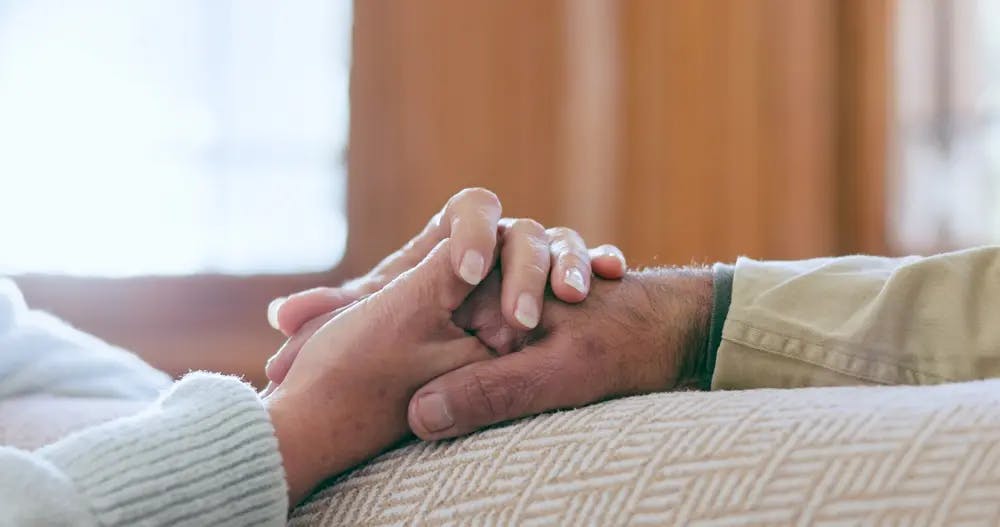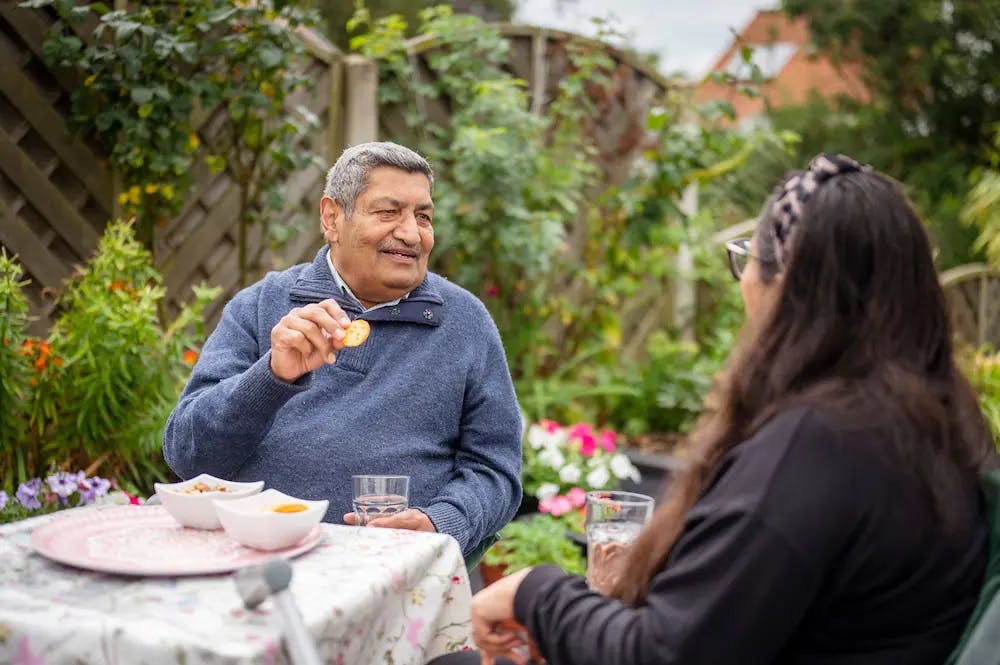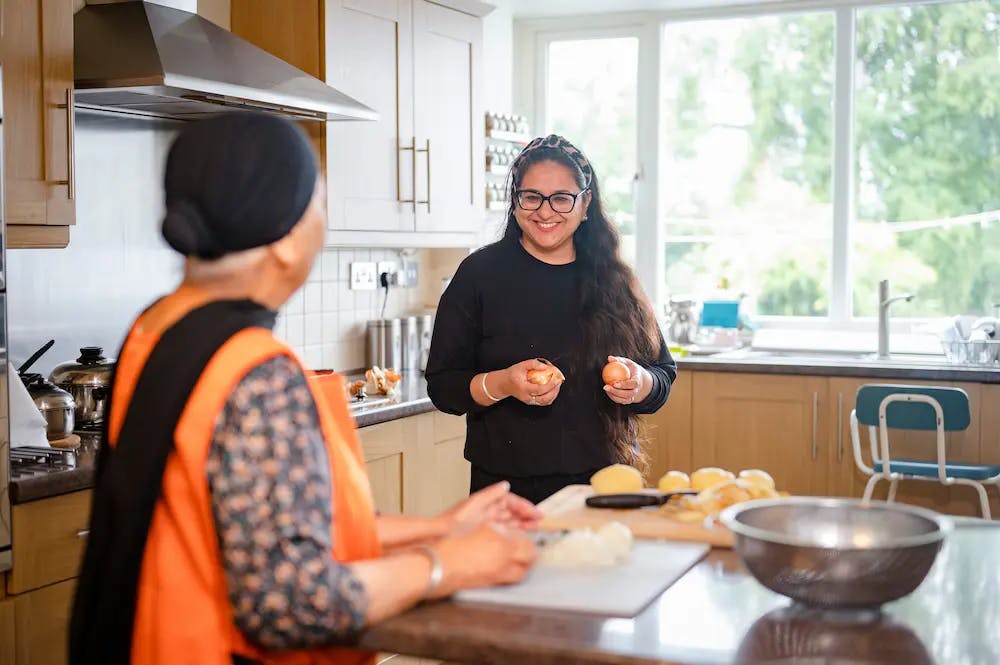What End of Life Care at Home Involves

Estimated Reading Time: 7 minutes
A loved one nearing the end of their life is a tough time for everyone concerned. End-of-life care at home aims to ease some of these emotions, with your loved one able to spend the last few days, weeks or months of their life in a peaceful setting that they feel relaxed in, while also receiving support to make them more comfortable.
In this article, we’ve explained what end-of-life care at home is what it involves, when it should begin, who provides it and who pays for it.
Arrange compassionate end of life home care
Browse end of life care at home in your area.
In this article:
- What is end-of-life care at home?
- When does it begin?
- What does it involve?
- Who provides it?
- What’s the difference between palliative care and end-of-life care?
- Who pays for it?
- Financial support
- Find end-of-life care at home near you
What Is End-of-Life Care At Home?
End-of-life care refers to care and support given to those who are in the last months or years of their life. End-of-life care focuses on making these final days, weeks or months as comfortable as possible.
End-of-life care at home is given to your loved one within their home, allowing them to feel at ease in a familiar environment, surrounded by their loved ones.
Family members and friends are often provided with emotional support and counselling as part of end-of-life care as well.
End-of-life care can also be given in a care home, a hospital or a hospice (or through hospice care at home), depending on what care your loved one requires and which environment they feel most comfortable in.
When Does End-of-Life Care At Home Begin?
End-of-life care is flexible - it begins when someone starts to need it and can last anywhere from a few days to several months.
For example, your loved one may have experienced a sudden stroke or a similar condition, so they might only need end-of-life care for a few days or weeks, or they could receive consistent end-of-life care for a condition over several months or even years.
Somebody receiving end-of-life care at home will usually no longer be able to live independently, with regular care and support needed, including assistance with personal care.

What Does End-of-Life Care At Home Involve?
Your loved one may need help with everyday tasks, household assistance and emotional support, such as:
- Personal care (including getting dressed and undressed, getting in and out of bed, washing and using the toilet)
- Preparing and cooking meals
- Admin tasks such as dealing with finances
- Administering medication
- Symptom management
- Mobility support
- Companionship
- Arranging for other healthcare professionals to visit your loved one in their home where needed
We can help you find the best palliative care at home for your or your loved one’s care needs. Request a free list of home care agencies, and our care experts will match you with suitable carers with availability in your local area.
Who Provides End-of-Life Care?
Depending on your loved one’s needs, a range of health and social care professionals could provide end-of-life care, including:
- Doctors and nurses
- Specialist home carers
- Care home staff
- Hospice staff
- Social care workers
- Counsellors
- Physiotherapists and occupational therapists
What’s The Difference Between Palliative Care And End-of-Life Care?
Palliative care is given to people with an incurable illness or condition. This type of care is much broader and lasts longer than end-of-life care.
End-of-life care is considered a part of palliative care and often occurs towards the end of somebody’s life. However, end-of-life care can still last for an extended period of time. There are five stages of palliative care, with end-of-life care often beginning during stage 4.
Palliative care helps to make your loved one as comfortable as possible, while also managing their pain and other symptoms.
Similar to end of life care, palliative care can include support for family members, close friends and carers.
Who Pays For End-of-Life Care At Home?
There are a range of options that end-of-life care at home can be paid for:
- Local authority funding - A care needs assessment will determine what support your loved one requires. If they’re assessed as needing end-of-life care at home, a financial assessment will then follow. This will determine who pays for the care
We’ve listed the UK savings thresholds below. If your loved one’s savings and income are below the lower savings threshold, they’ll qualify for maximum local authority support. If their savings and income are between the two thresholds, they’ll qualify for partial support.
| Country | Upper Threshold | Lower Threshold |
|---|---|---|
| England | £23,250 | £14,250 |
| Scotland | £32,750 | £20,250 |
| Wales | £50,000 | N/A |
| Northern Ireland | £23,250 | £14,250 |
Self-funding - Looking again at the table above, if your loved one’s savings and income are above their country’s upper threshold, they’ll be required to self-fund their home care
NHS continuing healthcare - If eligible for NHS continuing healthcare, your loved one’s care will be entirely arranged and paid for by the NHS, including any specialist equipment that’s needed for their home
Charitable organisations - Some charities - such as Marie Curie and Sue Ryder - offer invaluable support, including counselling, transport and home visits. In some cases, charities will help pay for your loved one’s care at home, although this isn’t always the case. You can reach out to your local branch to find our how they can support you or your loved one

What Financial Support Is Available?
If you’re looking after a loved one at home who is nearing the end of their life, you could be eligible for several forms of financial support. We’ve listed the main support options below.
Carer’s Allowance and other government benefits
Carer’s Allowance is given to people who spend at least 35 hours a week caring for someone who needs care and support throughout the week.
The Carer's Allowance rate is currently £76.75 per week, which can be paid every week or every four weeks.
Other benefits you may be eligible for include:
- Support from your local council
- Council Tax Reduction
- Pension Credit
- Universal Credit
- Income Support
- Carer's Allowance Supplement (in Scotland)
- A range of other grants and bursaries
Bereavement Support Payment
If the person you care for is your spouse or civil partner, you may be eligible for Bereavement Support Payment when they pass away. To get the full amount, this must be claimed within three months of their passing away. If you claim after this time, you’ll receive fewer monthly payments.
Help with bills
You could be eligible for various payments and similar support to help you pay bills while looking after someone at home. This help includes:
Find End-of-Life Care At Home Near You
We’re partnered with the best home care agencies across the UK, many of which offer end-of-life care at home for your loved one, including in the following locations:
- South West England
- South East England
- London
- East of England
- West Midlands
- East Midlands
- Yorkshire and the Humber
- North West England
- North East England
- Scotland
Lottie matches care seekers with the best home carers for their care needs. You can request a free home care shortlist, where we’ll find you home care providers with availability in your local area.
Frequently Asked Questions
What are the stages of end-of-life care?
End-of-life care often lasts for a short time, so it doesn’t always have clearly defined stages. However, palliative care is considered to take place across five distinct stages, with end-of-life care occurring during stage four. These stages are:
- Creating a personalised care plan
- Emotional support
- Early-stage support
- End-of-life care begins
- Providing support to loved ones
What are common symptoms in the last 48 hours of someone’s life?
- Irregular breathing
- Confusion and restlessness
- Eating and drinking less
- Feeling drowsy
- Feeling colder due to a lack of regular blood flow
How long does end-of-life care at home last?
How long end-of-life care at home lasts for your loved one depends on their condition and wellbeing. End-of-life care can last just a handful of days, but for others, it can last several months or longer.



